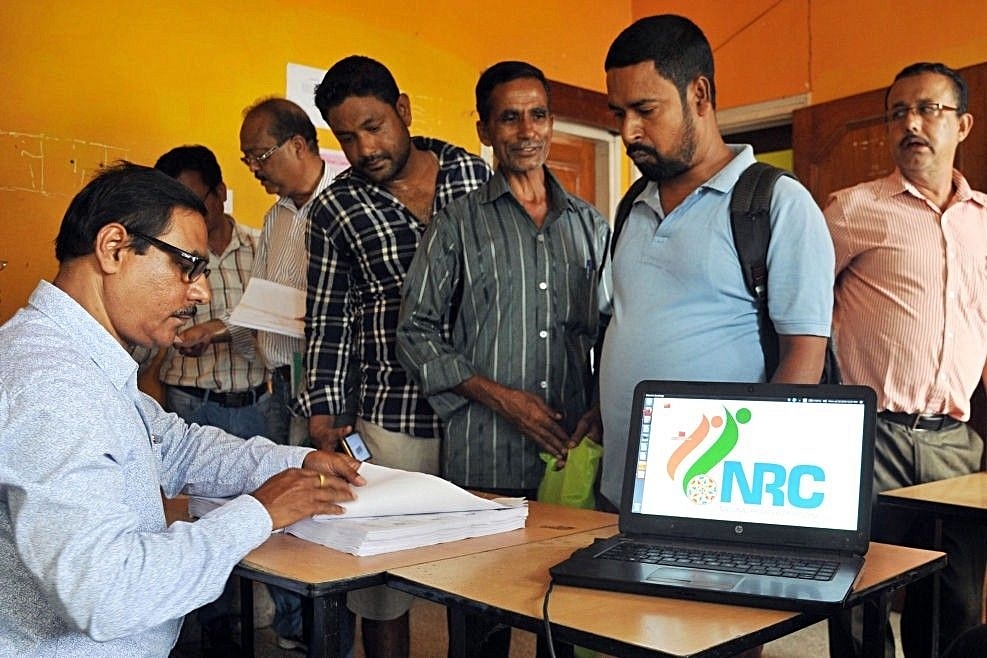Politics
Assam’s NRC Exercise Offers A Vital Lesson For Its Nationwide Replication
- Top state government officers say that development work also suffered because of the preoccupation with NRC.
- They estimate that Assam has fallen behind by at least five years due to regular work not getting done in government offices.

People check their names on the final draft list of Assam’s NRC list in Guwahati. (Rajib Jyoti Sarma/Hindustan Times via GettyImages)
For over four years, 55,000 government employees in Assam toiled in more than 2,700 NRC Seva Kendras in the state to update the state’s NRC.
This resulted in work in many government offices grinding to a standstill for four years! The worst affected were departments like land revenue, agriculture, education, food & civil supplies, irrigation, panchayat & rural development, health and social welfare, all of which cater to the vital needs of the masses.
In addition to the 55,000 government employees who were deployed exclusively to receive applications, scrutinise, collate and verify them at the NRC Seva Kendras, many other mid-ranking officers also had to take time off from their regular office work to oversee the updation process.
That meant that in many other state government offices as well, work kept piling up because mid-ranking officers could not devote their full time and attention to their regular work.
Here again, the worst affected were the offices of the deputy commissioners of all districts. And that’s because Additional Deputy Commissioners -- key officers in the district headquarters -- were designated as the overseeing authorities for the NRC updation exercise.
The offices of the deputy commissioners (known as district magistrates in most states) act as the direct interface between the state government and citizens.
“These officers had to devote a considerable amount of time -- at least three days a week -- to NRC-related work. Naturally, a lot of their regular work suffered,” said an IAS officer who is now the secretary of a department.
Another senior IAS officer who retired as a commissioner a couple of months ago said that in many vital departments like revenue, social welfare and food & civil supplies, virtually no work was done in the last four years!
“The revenue department is a vital one that deals with many important public matters. But nothing could be done as a majority of key officials of the department were deployed for NRC-related work,” said the retired bureaucrat.
The worst sufferers were school children, especially in rural and semi-urban areas. Many school teachers were drafted for NRC duties and thus could not conduct classes.
“Many government schools functioned with skeletal staff and over the past four years, classes could not be held regularly in more than 60 per cent of the schools. The acute shortage of teachers meant one teacher had to teach two or three classes jointly,” said a senior official of the education department.
Top state government officers say that development work also suffered because of the preoccupation with NRC. They estimate that Assam has fallen behind by at least five years due to regular work not getting done in government offices.
There is, thus, a huge backlog of files that have to be cleared and the officers say it will take at least three years to clear the backlog. The cost of such a backlog is too huge to be quantified, but the sufferers are the people of the state.
Also, more than Rs 1300 crore was spent on the entire NRC updation exercise. That, for a resource crunched state like Assam, is a substantial sum.
Economists say that the state’s economy also suffered since a lot of government and development work got stalled during these four years.
“There is a cost to delay in getting government approvals and clearances, and the economy suffers ultimately,” said a professor of economics at Gauhati University.
The enormous loss suffered by Assam due to the NRC updation project should serve as a lesson for the proposed nationwide exercise.
India can ill-afford to suffer similar losses at the nationwide level. Innovative methods and procedures should be evolved so that government works and projects in the states do not grind to a halt or suffer delays. And, not a single school student in the country should suffer because of the NRC updation exercise.
Introducing ElectionsHQ + 50 Ground Reports Project
The 2024 elections might seem easy to guess, but there are some important questions that shouldn't be missed.
Do freebies still sway voters? Do people prioritise infrastructure when voting? How will Punjab vote?
The answers to these questions provide great insights into where we, as a country, are headed in the years to come.
Swarajya is starting a project with an aim to do 50 solid ground stories and a smart commentary service on WhatsApp, a one-of-a-kind. We'd love your support during this election season.
Click below to contribute.
Latest